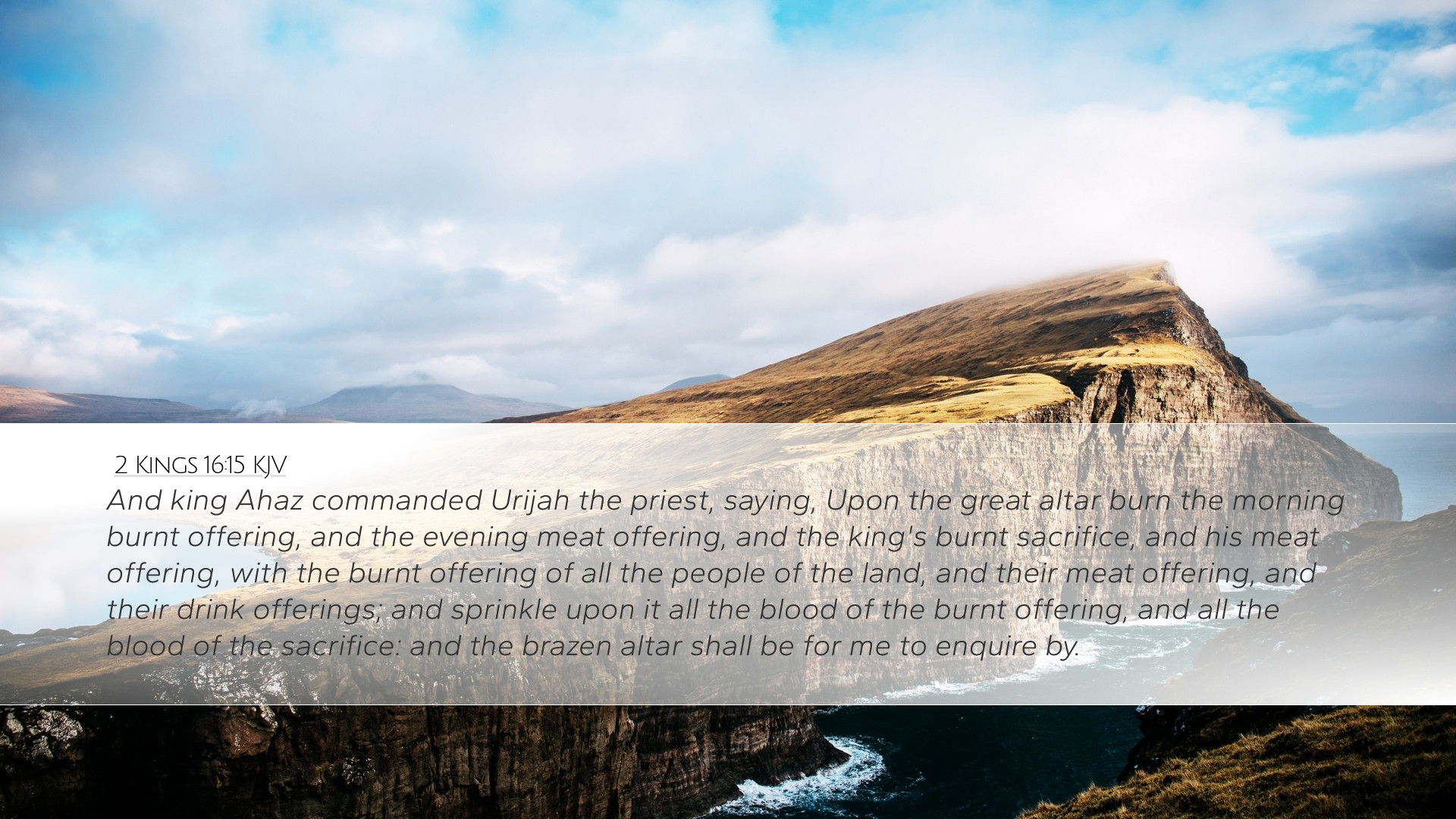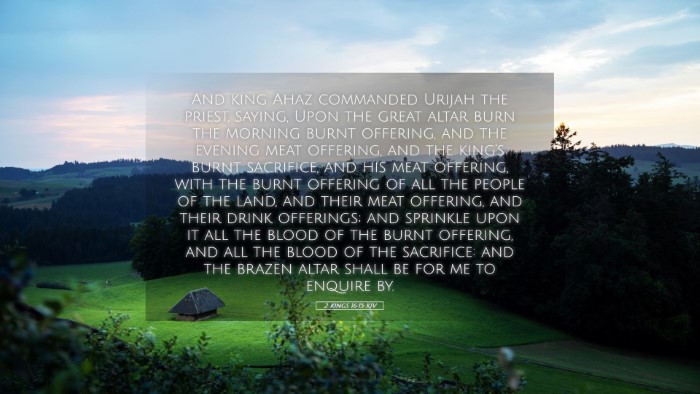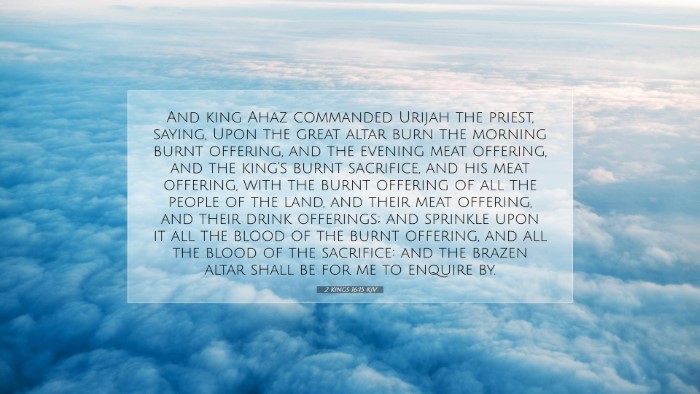Old Testament
Genesis Exodus Leviticus Numbers Deuteronomy Joshua Judges Ruth 1 Samuel 2 Samuel 1 Kings 2 Kings 1 Chronicles 2 Chronicles Ezra Nehemiah Esther Job Psalms Proverbs Ecclesiastes Song of Solomon Isaiah Jeremiah Lamentations Ezekiel Daniel Hosea Joel Amos Obadiah Jonah Micah Nahum Habakkuk Zephaniah Haggai Zechariah Malachi2 Kings 16:15
2 Kings 16:15 KJV
And king Ahaz commanded Urijah the priest, saying, Upon the great altar burn the morning burnt offering, and the evening meat offering, and the king's burnt sacrifice, and his meat offering, with the burnt offering of all the people of the land, and their meat offering, and their drink offerings; and sprinkle upon it all the blood of the burnt offering, and all the blood of the sacrifice: and the brazen altar shall be for me to enquire by.
2 Kings 16:15 Bible Commentary
Commentary on 2 Kings 16:15
Verse Text: "And the king commanded Urijah the priest, saying, Upon the great altar burn the morning burnt offering, and the evening meat offering, and the king’s burnt sacrifice, and his meat offering, with the burnt offering of all the people of the land, and their meat offering, and their drink offerings: and sprinkle upon it all the blood of the burnt offering, and all the blood of the sacrifice: and the brazen altar shall be for me to inquire by."
Introduction
The passage of 2 Kings 16:15 records a pivotal moment in the reign of King Ahaz of Judah. This verse encapsulates a significant deviation from the established worship practices, reflecting both Ahaz's personal desires and the broader context of religious trends in Israel during this turbulent time.
Historical Context
Ahaz ascended to the throne of Judah during a time of national distress, with threats from Israel and Syria looming large (2 Kings 16:5). His response to this crisis was to seek alliances with surrounding nations, particularly Assyria, which would ultimately jeopardize the integrity of Yahweh worship in Judah. Understanding the historical and sociopolitical backdrop is crucial for comprehending this king's actions as outlined in our text.
Analysis of the Verse
-
Divine Worship vs. Personal Ambition:
Ahaz's command to Urijah the priest to utilize the altar for personal and national offerings reflects a fundamental shift in focus from Yahweh to political strategies. The offerings, traditionally meant for atonement and communion with God, were now subjugated to the king's desires.
-
Role of Urijah the Priest:
Urijah's compliance with Ahaz's directive raises questions regarding his integrity and the spiritual leadership of the priests during this era. The priesthood was supposed to maintain purity in worship practices, yet Urijah's actions suggest a troubling alignment with the king's will, jeopardizing the sanctity of the worship prescribed in the Law.
-
Inverted Priorities:
The verse lists various offerings including 'the king’s burnt sacrifice', indicative of a troubling trend where royal authority intrudes upon divine prerogatives. The blending of royal and religious duties often leads to a compromise of holiness, as seen in the subsequent narrative of the Israelite kings.
-
Blood Rituals:
The explicit mention of blood rituals reiterates the importance placed on sacrificial offerings in the ancient context. Blood, symbolizing life and atonement, serves as a reminder of the costly nature of sin and the need for reconciliation with God, which this action ultimately undermined.
Theological Implications
-
Sovereignty of God:
This event signals a faltering recognition of God’s sovereignty. Rather than seeking guidance from the Lord, Ahaz opted for methods aligned with imperial power. The contrast illustrates a recurring biblical theme where humans attempt to forge alliances or manipulate situations instead of relying on divine providence.
-
Importance of True Worship:
Ahaz's actions emphasize the essential nature of worship being centered on God’s instructions rather than human preferences. True worship requires adherence to God's covenant, which Ahaz blatantly disregards. This disobedience leads to detrimental consequences, both spiritually and nationally.
-
Warning for Leadership:
This passage stands as a caution for present-day leaders within the church and society. The blending of secular power with spiritual authority often leads to compromise and corruption. Leaders are challenged to maintain integrity and faithfulness to God's commands amidst external pressures.
Application for Today
As modern pastors, theologians, and students of scripture reflect on 2 Kings 16:15, several applications emerge:
-
Maintain Focus on God:
Believers are called to prioritize their relationship with God above all else, ensuring that worship practices are aligned with biblical principles rather than cultural or political pressures.
-
Integrity in Leadership:
Church leaders should strive to lead with integrity, ensuring that their personal ambitions do not overshadow their spiritual responsibilities.
-
Understand Historical Precedents:
Understanding the cyclical nature of Israel's religious decline serves as a powerful reminder of the dangers of syncretism and complacency within the faith community.
Conclusion
2 Kings 16:15 serves as a poignant reminder of the delicate balance between divine worship and human authority. The actions of King Ahaz usher in a period of spiritual compromise that reverberates throughout the history of Israel. As we study these events, let us seek an unwavering commitment to God's sovereignty and the true essence of worship that honors Him alone.


